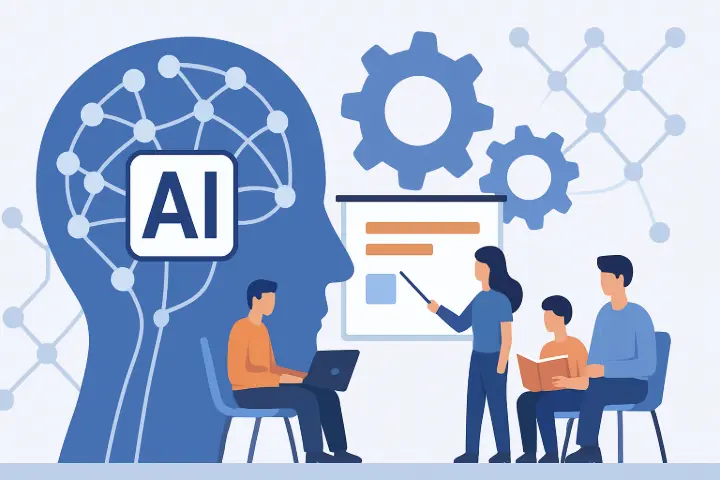Introduction to E-Learning & AI in Corporate Training
Corporate training has always been critical for staff development and business success. Traditional training techniques, such as in-person workshops, printed manuals, or lengthy lectures, are typically time-consuming, expensive, and difficult to scale. With the development of digital transformation, e-learning and Artificial Intelligence (AI) are redefining how businesses teach their workforce.
Businesses that integrate AI into e-learning systems may now deliver personalised, on-demand, and data-driven learning experiences that are tailored to specific employee needs. This innovation assures that corporate training is not just about compliance, but also about actual skill development and business progress.
Why E-Learning Alone is Not Enough
When compared to traditional training, e-learning solves several difficulties since it is less expensive, more scalable, and available at any time. However, traditional e-learning systems frequently use a "one-size-fits-all" approach. Employees may still be disengaged, courses may not fit their learning speed, and managers may struggle to determine the genuine effect.

Without AI, e-learning may become stagnant, lacking flexibility and interactivity. That is where AI comes in to take business training to the next level.
How AI Enhances Corporate Training
Personalized Learning Paths
AI analyzes employee skills, roles, and performance data to recommend customized courses. For example, a new sales executive might get more modules on negotiation skills, while a manager may receive leadership-focused content.
Smart Content Delivery
Instead of long, boring courses, AI breaks training into bite-sized “micro-learning” modules. These are easier to consume and more effective for knowledge retention.
Virtual Tutors & Chatbots
AI-powered chatbots act as 24/7 learning assistants. Employees can ask questions and get instant answers, just like interacting with a personal tutor.
Predictive Analytics
AI helps managers track employee progress and predict training outcomes. For instance, it can highlight who might need extra support before they fall behind.
Gamification & Engagement
AI enables interactive quizzes, simulations, and gamified learning experiences, keeping employees motivated and engaged.
Benefits of AI-Powered E-Learning for Businesses
- Cost Savings: Reduces the need for physical trainers, travel, and printed materials.
- Scalability: Training can be rolled out to thousands of employees worldwide with minimal effort.
- Faster Skill Development: Employees learn at their own pace with content tailored to them.
- Better ROI on Training: Companies can measure real performance improvements instead of just course completion rates.
- Employee Satisfaction: Modern, interactive, and flexible training boosts morale and retention.
Real-World Applications
- Finance Industry: Banks use AI-driven e-learning to train staff on compliance and risk management with adaptive scenarios.
- Healthcare: AI tailors training for nurses and doctors, ensuring up-to-date knowledge in fast-changing medical fields.
- Retail & Customer Service: Companies train frontline employees with AI chatbots and simulations to handle customer interactions effectively.
Conclusion

In summary, the integration of AI into e-learning marks a major shift in corporate training, turning it into a more efficient, scalable, and impactful process. By focusing on personalization and real-time adaptability, businesses can foster continuous employee growth while aligning learning outcomes with organizational goals. This transformation not only enhances workforce capability but also drives long-term business success.
Learning isn’t just about taking courses online. It’s about growing at your own pace, with smart tools that guide and support you every step of the way.”
AI makes learning smarter by suggesting the right courses for each person, giving instant feedback, and helping learners stay motivated. Instead of a “one size fits all” training, AI makes it personal and easier to understand.
Not at all. Even small businesses can use AI-powered e-learning. Many platforms are affordable and flexible, so teams of any size can benefit from faster, smarter training.
No, AI won’t replace trainers. Instead, it helps them. AI takes care of repetitive tasks like grading or tracking progress, while trainers focus on guiding, mentoring, and sharing real-life experiences.
E-Learning & AI: The Future of Corporate Training